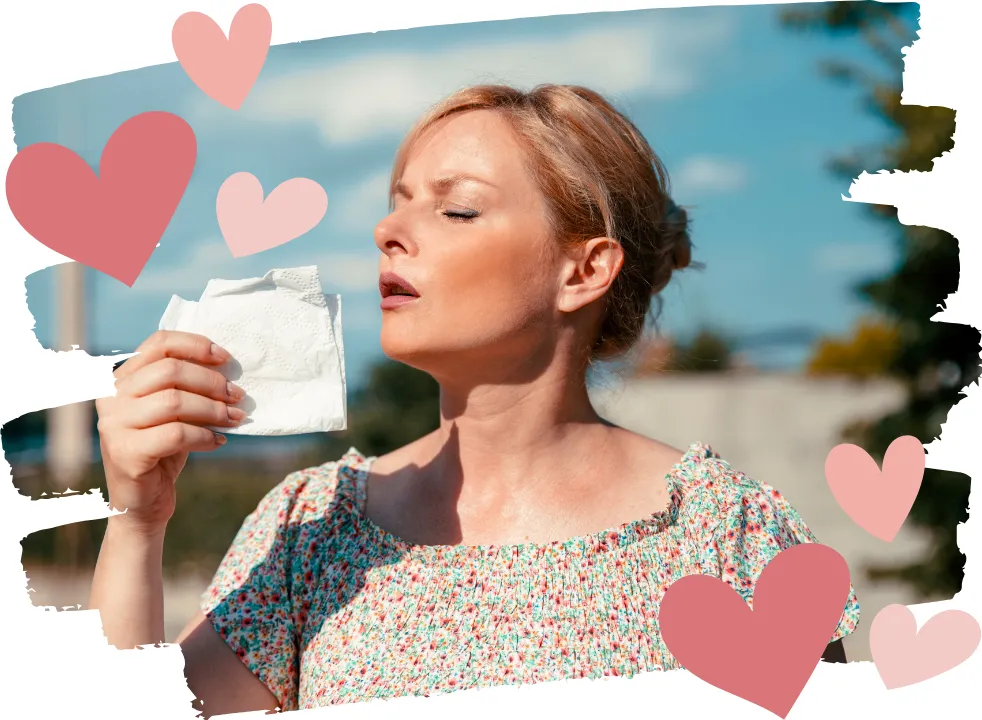
Midlife Meltdown? Your Guide to Managing Hot Flashes & Night Sweats
✨ Perimenopause Power Moves: 5 Simple Nutrition Shifts to Help You Feel Like Yourself Again! ✨
Grab your free guide today!
👉 Download Now!
Midlife Meltdown? Your Guide to Managing Hot Flashes & Night Sweats
Hurt of this magnitude is like menopause," Phyllis tells me. I've just wiped my nose with one of the hats. She takes it from me and hands me a tissue. "Comes in hot flashes. Just when you feel like you can't take it anymore, it passes for a bit. But it comes back, boy does it. — Tarryn Fisher
Hot flashes and night sweats are two of the most common (and maddening) symptoms of perimenopause. One minute you're fine, the next you’re sweating like you ran a 10K in the desert—with a side of heart palpitations and panic. So what’s going on?
The Science Behind Hot Flashes and Night Sweats
Hot flashes and night sweats are two of the most common (and maddening) symptoms of perimenopause. One minute you're fine, the next you’re sweating like you ran a 10K in the desert—with a side of heart palpitations and panic. So what’s going on?
Why Does Perimenopause Cause Hot Flashes?
At the root of this internal inferno is the hypothalamus—your body’s thermostat. Fluctuating estrogen levels make it hypersensitive, so even small changes in body temp can set off a full-blown reaction.
🔁 The Chain Reaction: How a Hot Flash Happens
Here’s what’s going down under your skin:
Blood vessels dilate, creating that sudden wave of heat and redness.
Sweat glands go into overdrive, trying to cool you down.
Your heart rate spikes, often causing anxiety or restlessness.
“Let’s face it, a hot flash is nature’s way of saying ‘This would be a good time to open a window.'” – Joan Rivers
The Midnight Sauna: Why Night Sweats Hit Harder
Your core body temperature naturally drops at night to support sleep. But for perimenopausal women, the hypothalamus misreads this as overheating, kicking off that same sweaty overreaction—right when you need rest the most.
Other Contributing Factors:
Neurotransmitter Imbalances: Estrogen helps regulate serotonin and norepinephrine, which affect body temp.
Stress & Cortisol: High cortisol levels = worse vasomotor symptoms.
Blood Sugar Swings: Sudden drops can trigger adrenaline spikes and hot flashes.
My Pajamas Were Soaked: What Finally Helped
A few years ago, night sweats were ruling my life. I’d wake up drenched, heart pounding, wrapped in soaked sheets. It wasn’t just uncomfortable—it was emotionally exhausting.
Then I tried bioidentical progesterone.
Within weeks, the night sweats vanished. I slept better, felt calmer, and actually woke up rested. Progesterone boosts GABA, a neurotransmitter that calms the brain. For me, it was like someone finally turned the chaos dial down.
💬 Note: Always work with a hormone-literate provider to figure out what’s best for you. Every body is different.
Cool It Down: Hot Flash Hacks That Work
You might not be able to stop the rollercoaster, but you can absolutely slow it down with these proven tips:
1. Dress Smart
Breathable fabrics (cotton or bamboo).
Layer up so you can peel down.
Try moisture-wicking sleepwear.
2. Optimize Your Environment
Keep the bedroom cool (60–67°F).
Use a fan or cooling pillow.
Sip cold water before bed.
3. Avoid Triggers
Common culprits? Alcohol, caffeine, spicy foods, and stress.
Keep a symptom diary to track what sets you off.
4. Manage Stress
Mindfulness, yoga, and deep breathing can help.
Apps like Insight Timer offer guided relaxation.
5. Prioritize Sleep Hygiene
Cooling bedding and blackout curtains are your BFFs.
Use white noise or calming sounds to stay asleep longer.
Relief, Please! Natural + Medical Options
Herbal Supplements
Black cohosh and red clover: Some find relief, others don’t.
Important note: Black cohosh has been linked to rare cases of liver issues, so it’s important to use with caution and under medical supervision—especially if you have any existing liver conditions or are taking other medications.
As Dr. Andrew Weil says:
“Herbal supplements can be helpful but should always be used under medical supervision to avoid potential interactions with medications.”
Acupuncture
Some studies show it can reduce hot flash frequency by balancing energy pathways (and lowering stress).
Bioidentical Hormones
These mimic your body’s own hormones.
Dr. Mary Claire Haver says:
“For women with severe symptoms, bioidentical hormone therapy can be life-changing. A personalized approach with a trusted doctor is essential.”
Non-Hormonal Meds
SSRIs, SNRIs, and gabapentin have shown promise for some women, especially those avoiding hormone therapy.
Embracing the Journey
Hot flashes and night sweats aren’t just sweaty annoyances—they’re part of a deeper hormonal shift that deserves compassion and care. They’re also a sign that it’s time to start putting yourself first.
Relief is possible. Whether it’s through lifestyle changes, hormones, or herbs, the goal is to feel more like you again.
✨ Final Thoughts
Hot flashes and night sweats are a part of perimenopause—but they don’t get the final say. With science-backed tools, self-advocacy, and support, you can ride the heatwave with resilience and come out stronger on the other side.
🩺 One More Thing…
Before starting any supplements, hormones, or alternative therapies, always check in with a qualified healthcare provider—ideally one who understands the nuances of perimenopause. What works wonders for one woman might not be right for another, especially if you’re already on medication or managing other health conditions. Your body, your journey—informed choices make all the difference.
Hormonally Yours,
Kimberlee Erin
Just a heads-up: I’m a Certified Menopause Coaching Specialist and Holistic Nutritionist, and while I love sharing what’s worked for me and my clients, this blog is for informational purposes only. It’s not a substitute for medical advice. Always check in with your healthcare provider before starting new supplements, hormones, or treatments—especially since every woman’s perimenopause journey is different. You deserve personalized care that truly fits you.